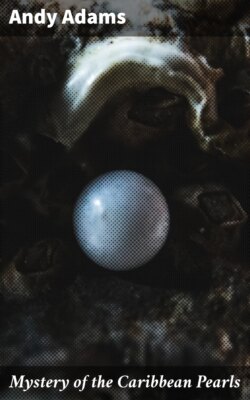Читать книгу Mystery of the Caribbean Pearls - Andy Adams - Страница 3
На сайте Литреса книга снята с продажи.
CHAPTER I
Discovery!
ОглавлениеTable of Contents
Lightning streaked the skies over the Windward Islands. The Caribbean Sea was a tumbled mass of foaming, angry waters.
The chabasco had struck with the quickness and lashing fury that is the nature of this most feared of tropical storms. A chabasco strikes without warning, with tornado-like violence, whirling and smiting and soaking. The storm ends as abruptly as it begins. The air regains its calm. Only the churned-up waters continue to smash upon the shore.
A final, brilliant flash of lightning revealed the gaunt figure of a man stumbling through the raging surf, fighting to reach the safety of the beach. He staggered out of the roiling waters and fell face down on the sand. His only motion was the agonized heaving of his shoulders as he gasped for breath.
His boat, his diving gear were gone, smashed to bits by the wildness of the storm which had washed him ashore on this tiny speck of an island. The island, he knew, was in the Baie du Trésor, Treasure Bay, off the east coast of the big island of Martinique.
As strength flowed back into the man’s body, he sat up. Frantically he shot his hand into a pocket of his wet, worn, sun-bleached dungarees. An expression of relief crossed his face. In the faint light of a rising moon, he inspected the two objects in the upturned palm of his hand.
He held two perfectly matched black pearls.
This was the end of his search, the end of weeks under the blazing sun of the Caribbean; the result of hundreds of dives to the bottom of the sea. He knew, and he had the evidence in his hand, that he had made a discovery which would startle the entire area of the Caribbean Sea from the Florida keys to the coast of South America.
He had discovered a pearl fishery so fabulous, so unbelievably rich, that his find would make headline news throughout the world.
He knew also that unless he could keep his find secret until his claim on the pearl fishery was established, treasure seekers and money-mad cutthroats would descend on him like hungry sharks.
He felt sure that his actions and explorations had been secretly watched. He knew who the watchers were—unscrupulous men waiting hungrily to move in and jump the claim he had struggled so hard to find.
His first problem was to get off this tiny speck in the bay and back to Martinique. He was no more than five miles off the shore of the main body of the big island. If he had reckoned his position correctly, there was a long spit of land jutting out from Martinique that he could reach by a two-mile swim. He would need to rest. Calm now, he settled into the sand to sleep.
When the man awakened, the light of a brilliant tropical morning proved that he had been correct in determining his position. The sandspit jutted out, welcoming him. Farther beyond he could see the lush, green-covered pitons rising in the center of Martinique. Some of these peaks reached a height of nearly four thousand feet.
The man began his long, slow swim. He had no fear of the sea—though he knew sharks abounded in these waters, and he was unarmed.
But by midmorning he had reached the mainland of Martinique safely. He was pleasantly tired from his long swim, and stretched out on the warm sands to rest and allow his clothing to dry.
In the early afternoon he reached the town of La Trinité, sprawling at the approach of Presqu’île de la Caravelle, the peninsula that formed the Baie du Trésor.
He found a room in a small pension, a rooming house, and spent most of the night writing two letters. One of them was addressed to his son in The Netherlands. The other was to Charles Keene on the island of Curaçao in the Netherlands Antilles.
Along with the letters, he carefully prepared two small boxes.
In the morning, he was standing at the post office door the moment it opened. It was with great relief that he saw his letters and packages go into the mailbag that would be trucked over the pitons to Fort-de-France at noon, then flown on to Curaçao on the night flight.
In his relief and great elation over his discovery, the man shed the characteristic watchfulness that usually marked his movements. He momentarily had dropped his guard, and did not notice that his every action had been closely followed from the moment he had arrived in La Trinité.
